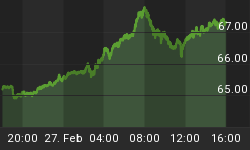The following is an excerpt from our September 16, 2005 market report:
Blinded by Fed-laced fairytales, Wall Street has been lulled to sleep by stories of a Goldilocks economy and a global savings glut.
The true tale is more akin to the Emperor's New Clothes as the Fed thinks it is wearing special cloth that "could distinguish the clever from the stupid." Problem is, there is no such cloth and someone should tell them. For your pleasure, we have posted a video of former Fed calls on the economy.
The real point here is that if a picture can tell a thousand words, the University of Michigan Consumer Sentiment Survey is the perfect snapshot of the economy.
We note that since the Fed began raising rates last year the University of Michigan Consumer Sentiment Survey has been on the decline. More importantly, last week's plunge to 76.9 shows consumer confidence has broken a thirty-year trend of rising sentiment - suggesting the consumer retrenchment we all feared has just now arrived.
Below is the chart we showed from the September 16, 2005 Head of the Trend newsletter.

We don't make a habit of crying wolf and have no intention of playing Chicken Little, but the sky is going to fall on the Goldilocks economists.
First note that the chart above simply reflects the rising tide of optimism amongst consumers since the 1979 trough when roughly 50% of Americans were dissatisfied with the economy as oil prices had crimped the economy and our confidence as a nation.
We recovered. Then, a decade later we saw another recession and the first Iraq war that many feared would be as bad or worse than the 1970s crisis. But this didn't register with the consumers who found a way out of the jobless recovery and Iraq.
A decade later we had the Nasdaq crash and 9/11 attack, but the consumer (now used to quick recoveries) borrowed money on top of borrowed money to front run the recovery. But new highs in home prices and small cap stocks have not been enough to convince the consumer that the economy was on the mend. This is why the stock market adjusted for gold shows the economy has gone nowhere since low ebb back in March 2003 when sentiment last touched rising trendline support. Last week's breakdown below the 2003 lows is like a dark cloud circling overhead and we will now walk with umbrellas on even the sunniest of days.
If the Fed thinks it can raise rates another time after this week we dare remind them that the consumer represents 2/3 of the economy and is made of gingerbread. "Oh dear!" the gingerbread boy said, "I'm quarter gone!" And then, "Oh, I'm half gone!" And soon, "I'm three-quarters gone!" And at last, "I'm all gone!" and never spoke again.















